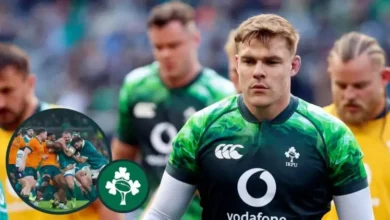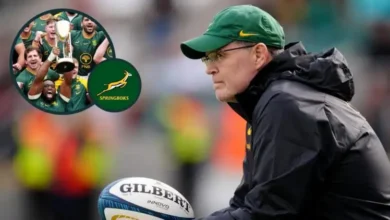Siya Kolisi opens up about stabbing incident in powerful interview with Dan Biggar
Since the conclusion of the 2023 World Cup, it seems that Siya Kolisi’s smiling face has been appearing on every newspaper, TV show, billboard and website possible. His charismatic leadership style and genuine soft nature has gained the double-World Cup winner admiration from all around the globe.
It has taken him some time to develop his strong moral sense and his capacity to unite disparate cultures. It’s the coming together of a man who has lived for thirty-two years, having encountered every aspect of life—good, unpleasant, or neutral.
In conversation with former Wales captain Dan Biggar, the Springbok captain revealed the dangers of working in his hometown pub as a youngster and talked about the difficulties he had as a teenager:When I was sixteen, I worked as an illegal bartender. People would occasionally throw tear gas in, but I had to stand at the cash register and close my eyes, so I couldn’t flee.
“There were people being stabbed at the door but people carry on partying. I had a violent childhood. I got into a fight and he stabbed me as I was walking away, so I went back and we fought some more.”
Kolisi was eager to clarify how he ended up in that violent environment in the first place, saying, “Gender-based violence occurs most frequently in South Africa.” The first two victims of abuse I knew were my mother and aunt.
It’s so common in my town that it’s accepted as the usual. Being impervious to stuff like that is not a good thing. Men rarely speak, thus if a male and a woman got into an argument, it would probably result in violence.
“I went through treatment to learn how to speak. I couldn’t give my wife everything since my heart was so hard and I didn’t know how to communicate, so I had to attend marriage counseling.
When I initially went to talk to someone in my late 20s, she told me, “You are damaged on every level.'” What you witnessed is not typical.
It’s terrible and excessive. You must talk about it and overcome it. You grow up and develop such a hard heart as a result. A conflict arises in the community; you resolve it by forgiving the other person and moving on. It’s customary in my neighborhood.
The Springbok captain is not scared to talk about his thoughts, and he makes it very evident why he needs to speak out, as we witnessed very clearly following the World Cup final.
“A lot of people have been in a dark place but you could see their joy when we travelled around South Africa,” he said. “It’s like they had been waiting for something to lift them. Some people couldn’t afford to watch us at home during the World Cup because you have to pay for the TV. People started opening up malls at 10pm to watch us play. Different backgrounds, different races, all sitting together.
“When I was younger and lived in a township, my main concern was getting by. How can I get by during the day? I now wish to inspire large thinking among the township residents. Dream big.
“We want it to go beyond the rugby pitch.”We can play rugby together. What will people remember you for? I am aware that if I give up, some women won’t receive items to assist shield them from assault, and some children won’t eat. That’s all that gets me through each day.
After speaking with Kolisi, Dan Biggar called the exchange “one of the most surreal and inspiring conversations I’ve had” and that it will “live with me for a long time.”




